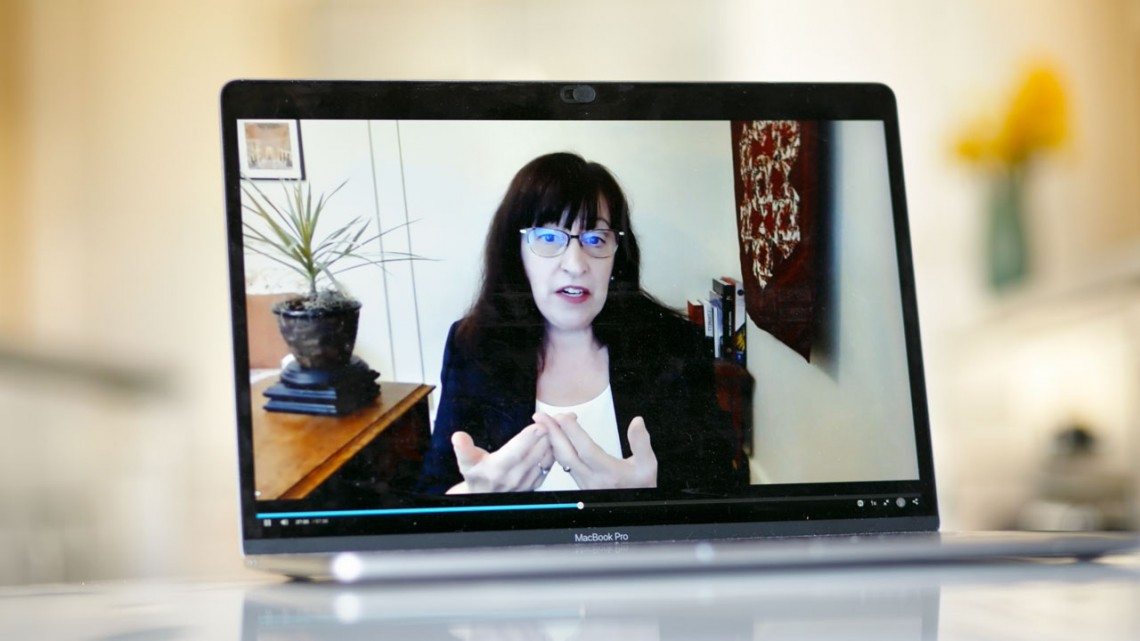
President Martha E. Pollack speaks during “Employee Assembly Open Forum with President Pollack: COVID – A Year Later,” on March 12.
One year in: Cornell’s leaders look back, and forward
By Krishna Ramanujan
On March 13, 2020, President Martha E. Pollack announced that the university was immediately suspending classes due to the newly declared COVID-19 pandemic. The expectation was that the pause would be temporary and business as usual would soon resume.
“And yet, here we are a full year later,” said Pollack during the Zoom broadcast of the “Employee Assembly Open Forum with President Pollack: COVID – A Year Later,” on March 12. The moderated Q&A included Pollack; Joel Malina, vice president for university relations; Ryan Lombardi, vice president for student and campus life; and Mary Opperman, vice president and chief human resources officer.
Looking back on the past year, Pollack focused on the many ways Cornell has pursued its mission throughout the pandemic. “We’ve learned a lot,” Pollack said. “We’ve learned some things that are going to make us do things differently and do things better.”
As university administrators coped with an unprecedented crisis that struck on multiple fronts, they developed responses that had an impact on nearly every aspect of Cornell’s community and operations – with some adaptations working so well that they may become part of Cornell’s post-pandemic future.
For admissions, Pollack said, the university developed a range of virtual engagement opportunities for prospective students and made standardized testing optional – both moves with positive implications for student equity, “so we’re seriously considering continuing them.”
With classes moving online, she added, a number of instructors opted for lower-stakes quizzes over high-stakes exams, both to reduce students’ stress and to avoid the need for complicated proctoring arrangements – and found that student engagement with the material improved.
Work-related travel was another casualty of the pandemic, but virtual meetings often provided an effective substitute. “We’re still going to travel, but if we reduce or eliminate travel that isn’t essential, it not only saves time and costs, but it also reduces our carbon footprint,” Pollack said.
When it came to adapting finances to the urgent realities of the pandemic, university leaders had to make tough decisions, Pollack said. Priorities included keeping the university community healthy and avoiding layoffs wherever possible, in spite of large losses in revenue and many new expenses, including the costs of creating a coronavirus testing program from scratch.
Cost-saving measures such as a pause to most construction; hiring and salary freezes; temporarily reducing retirement benefits for faculty and staff in endowed units; and temporary salary reductions in the contract colleges helped cover some of the shortfall. Fortunately, neither the large increase in student financial need nor the drop in enrollment that had been anticipated occurred: fall enrollment was near normal, while close to 15% of students who chose to enroll stayed home. The endowment is also doing well in a volatile market, Pollack said.
As a result, the university was able rescind many cost-saving measures as of Jan. 1 – after just five months instead of the expected year.
With a balanced budget for the coming year, Pollack said she is “very optimistic” that some new hiring can begin this summer, and that a modest salary increase will be possible, with the caveat that those decisions are pending. At the same time, in order to avoid future cycles of growth and cuts, “we will have increased rigor about jobs that we replace,” Opperman said.
Though hundreds of essential employees have been working on campus throughout the pandemic, the university learned that many employees could do their jobs well from home.
“Not every job is a candidate for remote work,” Opperman said, “but we do believe we have jobs that can be done partially or fully remotely.” The university will continue to survey remote workers about their experiences and evaluate individual requests along with organizational needs when the time comes. A few pilot programs have begun, Opperman said.
As the state begins to relax COVID-19 safety restrictions, the university will continue to follow New York state guidelines, Malina said. Along with a vital partnership with Cayuga Health System, “we’ve always had a close relationship with the state... and their network of health departments,” Malina said. “I can’t speak enough about our local Tompkins County Health Department.”
Cornell has applied to be a vaccine point of distribution site and is awaiting state approval, Opperman said. Once the state notifies the university as to whether the application was accepted, leaders will inform the community, she added.
“We haven’t made a decision on whether or not students will be required to have a vaccine,” and vaccine availability will be part of what determines that decision, Lombardi said. Whether vaccines will be mandatory for employees is also being discussed, Opperman said, adding that, at present, vaccinated Cornellians are still required to participate in surveillance testing.
Very complicated logistics loom over Commencement planning this spring. The spread of more contagious variants, the speed of vaccine rollouts, the health of the larger Ithaca and county communities, and the requirements of New York state guidelines will all play a part in determining what kind of event Cornell is ultimately able to hold.
The thought of “tens of thousands of people sitting elbow to elbow in a stadium – that seems unlikely,” Pollack said, though discussions of creative options have been ongoing. She advised people not to make Commencement plans until decisions are announced later this month.
To close, Pollack said, “one thing I’ve learned... about humanity, is how resilient people are.” She noted how well students have behaved and adhered to policies, and how faculty and staff have gone beyond the call of duty to keep the university running and students safe.
“I will never underestimate what a community can do for the greater good ever again,” Pollack said.
Media Contact
Get Cornell news delivered right to your inbox.
Subscribe
